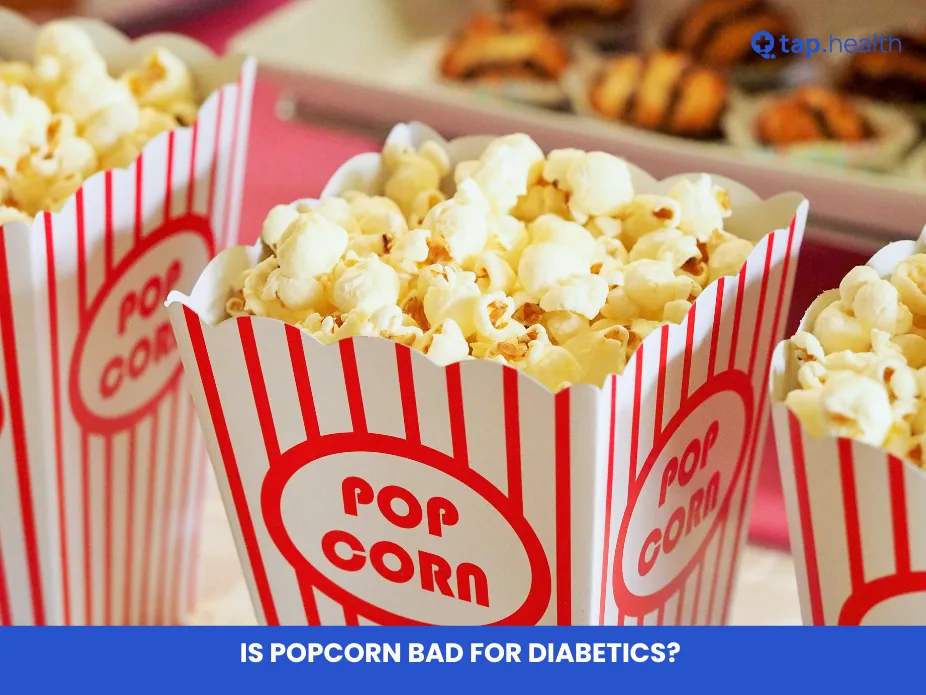Popcorn is one of the most loved snacks worldwide, but many people with diabetes wonder: is popcorn bad for diabetics? The short answer is no — popcorn is not inherently bad for diabetics when chosen and eaten wisely. In fact, plain air-popped popcorn can be a smart, low-calorie, high-fiber snack that fits well into a diabetes meal plan.
How Does Popcorn Affect Blood Sugar Levels?
Popcorn is a whole grain with a moderate glycemic index (GI) of 55–65. This means it raises blood sugar more slowly than high-GI foods like white bread or candy, but faster than very low-GI options like broccoli or lentils.
The key factors that decide how popcorn affects blood sugar are:
- Preparation method (air-popped vs. oil-popped vs. microwave with butter)
- Portion size
- Added toppings (butter, caramel, salt, cheese)
Air-popped popcorn has the lowest impact on blood glucose because it contains almost no added fat or sugar.
Popcorn Nutrition Facts Important for Diabetes Management
Per 1 cup (8g) of air-popped popcorn:
- Calories: ~31 kcal
- Carbohydrates: 6.2 g
- Dietary fiber: 1.2 g
- Protein: 1 g
- Fat: 0.4 g
The fiber content helps slow carbohydrate absorption, making popcorn better for blood sugar control than many other crunchy snacks.
Best Popcorn for Diabetics: Air-Popped Wins Every Time
For people managing diabetes, air-popped popcorn is the clear winner because:
- Lowest calories and fat
- No added oils or trans fats
- Retains natural whole-grain benefits
- Lower sodium than pre-packaged varieties
Avoid movie-theater popcorn and most microwave bags loaded with butter, palm oil, and artificial flavors — these can cause sharper blood sugar spikes and add unnecessary calories.
Recommended Portion Size for Diabetics
A safe serving for most people with diabetes is 2–3 cups of air-popped popcorn (about 15–25g of carbs total). This amount usually causes only a mild, manageable rise in blood sugar when eaten plain or with healthy toppings.
Smart Ways to Make Popcorn Even More Diabetes-Friendly
- Season with herbs & spices (garlic powder, paprika, nutritional yeast, cinnamon, rosemary)
- Drizzle lightly with extra-virgin olive oil instead of butter
- Pair with protein or healthy fat:
- Handful of almonds or walnuts
- String cheese
- Greek yogurt dip
- Sliced avocado
- Combine with non-starchy vegetables (mix in roasted chickpeas or kale chips)
These pairings lower the overall glycemic load of the snack and keep you fuller longer.
Popcorn and Type 1 vs Type 2 Diabetes
- Type 1 Diabetes: Count the carbs accurately (≈6g per cup) and bolus insulin accordingly. Pairing with protein/fat reduces the need for large correction doses.
- Type 2 Diabetes: Popcorn’s fiber and low calorie density support weight management and insulin sensitivity when eaten in moderation.
Real-Life Tips from People Living with Diabetes
Many diabetics successfully enjoy popcorn by:
- Measuring portions instead of eating from the bag
- Testing blood sugar 1–2 hours after eating to learn personal response
- Choosing “naked” air-popped kernels and seasoning at home
Expert Opinion on Popcorn for Blood Sugar Control
Endocrinologists and certified diabetes educators agree: plain popcorn in moderation is a reasonable snack for most people with diabetes. The American Diabetes Association includes plain popcorn on its list of smart snack choices.
Can Diabetics Eat Microwave Popcorn?
Most commercial microwave popcorn is not ideal because of added oils, salt, and sometimes sugar. However, there are now several “light” or “plain” microwave options with only 3–5g fat per serving — these can work occasionally if you stick to one serving.
Final Verdict: Is Popcorn Safe for Diabetics?
Yes — popcorn can be a safe, enjoyable, and even beneficial snack for people with diabetes when you choose air-popped, control portions, skip the butter and caramel, and pair it wisely.
Can a Diabetic Eat Popcorn Without Spiking Blood Sugar? Discover More at TapHealth Diabetes
For personalized diabetes meal plans, continuous glucose monitoring insights, and hundreds of diabetic-friendly recipes, visit TapHealth Diabetes — your trusted by thousands managing diabetes daily.



